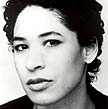 |
P.O.V.'s Borders visitors sent Rebecca
these questions in response to her work and her
answers to P.O.V.'s initial 6 Questions. Read on!
Question: Hello Rebecca. My question is, How
do you, as a biracial person, contend with racism in the lesbian
and greater queer community?
Rebecca: I find it disappointing, but no more or less than when
I find it elsewhere.
Question: Here's a biggie: what are your visionary ideas for
solving the issues/struggles you work on?
Rebecca: I believe that psychotherapy and spiritual awakening are
major components of the new activism. People need to, individually,
wake up and stop looking to groups of any kind to define and liberate
them.
Question: I'm interested in your work with the Third Wave Foundation,
of which I understand you are a co-founder. What is the Third Wave
of feminism?
Rebecca: This would take a while to answer, but in the meantime,
check out our website,
and check out my first book, To Be Real: Telling the Truth and
Changing the Face of Feminism.
Question: What do you think is different about being an activist
today compared with the 60s and 70s? Do you think protesting and
marching is still worthwhile today?
Rebecca: I think we need all forms of activism, and that is one
of the main differences, that we recognize now that movement is
happening on multiple fronts simultaneously and must. It isn't just
the picket lines, or the marches on Washington, it's also the millions
of meditators, the thousands of organic farmers, the writers who
infiltrate curricula, etc. Change is not some linear, chronologically
defined thing. It is constant, it is multi-pronged, it is diverse.
Question: Hi Rebecca: as a healthy, successful lesbian woman,
what advice would you give to young lesbians struggling with race,class,etc.
issues? What was important for your survival — in forming your
queer identity.
Rebecca: I am bisexual, which means that I am attracted to people
irrespective of their anatomy and gender socialization. Insisting
on this freedom, in the face of all of the people who would rather
I choose one or the other, has been super important to my survival.
For young women exploring identity, I say read as much as you can,
talk as much as you can, join together in safe spaces as much as
you can. Isolation is dangerous, so work hard to find and make and
cherish community.
Question: How did you come to write Black, White and Jewish?
Did you write it for yourself?
Rebecca: I wrote it for myself and also for whoever else was drawn
to it. I believe in an Indian, Hindu notion of art, that you never
make art alone. The people who are wanting and needing and looking
for what you have to say are coming toward your art at the same
time you are making it and moving toward them. The magic happens
when the work and the audience meet. But it is a moment that has
been brewing below the surface for much longer than you think.
Question: As a younger person who is becoming recognized as an important
thinker/writer/activist (one of fifty future leaders of America!!),
what is it like to have two parents who were well-known in leftist,
activist movements?
Rebecca: Great. I have always been inspired by my parents' activism
and work. They are important models for me.
Question: I'm wondering what borders you think need to be crossed
in personal relationships in order to build healthy communities?
Rebecca: I think we must learn to forgive one another and stop seeing
ourselves as so separate and different and distinct from each other.
We need to realize that the space between us is an illusion, quantum
physics proves it.
Question: If they do a movie version of your book, who would you
want to play you? Seriously, what are your hopes for your book.
Rebecca: I would love for the book to continue to be a part of the
national and international discourse on race, class and culture.
It was translated into Hebrew and I would love for it to travel
to Europe, etc. A movie could be fun, though I would want a lot
of control because it is so personal, and so far no one wants to
give me that.
|
 |
 |


![]()






